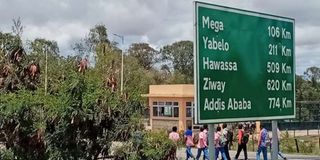Virus that hates colonial borders

Moyale town which sits near the Kenya-Ethiopia border point.
What you need to know:
- Even those chaps who smuggle people across the Sahara are doing roaring business.
- There are still Africans paying to get to Europe, though fewer than in pre-pandemic times.
- The attraction is that the waters and infiltration points are less policed as security officers cower from the virus.
I know a law-abiding man in Nairobi who, since March, has dutifully stayed away from crowded places and doing all the things that are supposed to reduce the risk of being infected by the coronavirus.
Now that it is possible to fly out again, he decided to make a trip to a neighbouring country. If he was a rogue, he would have travelled to the place much earlier even when lockdowns were still stringent in the region. But he didn’t.
The result is that his journey, which would have taken an hour, took him three days. He then flew out of the East African Community, stayed for then two days, then back next door.
That is the result of the mixed regime of Covid-19 travel rules, and the fact that some EAC countries’ airspaces are open while some aren’t. That conundrum, though, has created opportunities for those with a nose for it.
Smuggled goods
The other day a story in Daily Nation told of smuggled beer, bhang, sugar and cigarettes being seized at different points in Turkana County. You wouldn’t ordinarily imagine that Turkana would be a hotspot for virus-induced cross-border smuggling.
The story was remarkably global. A lorry carrying 400 crates of beer was impounded. It was from Uganda. Then 200,000 cigarettes smuggled from South Sudan through the Nadapal border point. Bhang was impounded; it was from Ethiopia, being transported to Turkana through the Todonyang border. A Probox with 20 bags of smuggled sugar was also impounded. We were not told where that was from.
They saved the best for last: Authorities also grabbed several kilogrammes of smuggled powdered milk that was being sold in Lodwar and Kakuma. It had been smuggled from the United Arabs Emirates.
There are people in our part of the world, indeed all over the world, who have incredibly genius minds for exploiting these crises. Perhaps nowhere is this drama playing out better than in southern Africa.
When South Africa imposed its lockdown, it also banned cigarettes and alcohol — booze just sends South Africans crazy. And to curb movement from Zimbabwe, in April it built a 40-kilometre fence along the common border for all of $2.1 million (Sh210 million). The jokes about the fence, some calling it chicken mesh, are galore.
It has been a blessing for booze and cigarette smugglers, who have been crawling through broken sections of the fence to transport the products and marking up their prices because of the added hurdle.
Illegal entry points
One report said that, from Zimbabwe, there are now more than 200 illegal entry points into South Africa, where smuggled cigarettes and booze are being sold under the counter in shops, in dark corners and from people’s backyards. How do people know where to find the items? It’s all on WhatsApp, which has become a kind of off-the-book Amazon store for illicit products in these Covid times.
Even those chaps who smuggle people across the Sahara for the perilous journey over the Mediterranean to Europe, or in the Horn of Africa through Yemen to the Gulf, are doing roaring business.
At the start, Africans fleeing virus-ravaged Europe to the safety of the mother continent would pay up to five times the cash they’d forked out to be transported to Europe. There are still Africans paying to get to Europe, though fewer than in pre-pandemic times. The attraction is that the waters and infiltration points are less policed as security officers cower from the virus.
At the same time, the Covid-19 border controls and movement restrictions have introduced greater roadblocks along the more traditional trafficking routes. The result is that the fellows going to Europe pay smugglers three to five times to get there than if they had done so this time last year. It is fascinating how Covid-19 has reorganised crime, commerce and questioned the logic of borders, albeit temporarily.
Colonial border making
While on the subject of borders, perhaps some of the seeds of this game can be found in colonial-era border making.
August 11 is an important date for today’s East African border map. We had a reminder of it in a tiny story in a bottom corner in Nation’s sister paper Daily Monitor in Uganda. I will reproduce here without much comment:
“Kisumu, Naivasha transferred from Uganda to Kenya.
“Today in history, August 11, 1902.
“The Uganda Order-in-Council 1902 was signed at the Court of Buckingham in England.
“The document, also known as the Uganda Order-in-Council, 1902, officially transferred from Uganda the Kisumu and Naivasha territory to the East African Protectorate, now Kenya.
“…the said territories…shall be known as the Kisumu and Naivasha provinces.”
By inspiring such a delightful subversion of borders, this virus is telling us that it knows its history too.





